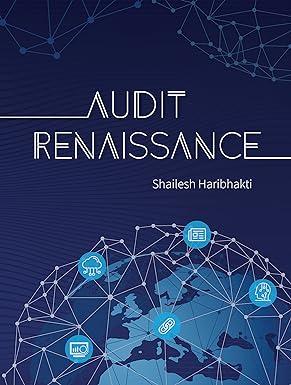Question
2. Discuss the management accounting and control systems used for Atlanta Home Loans. As part of your answer to this question: Describe the various management
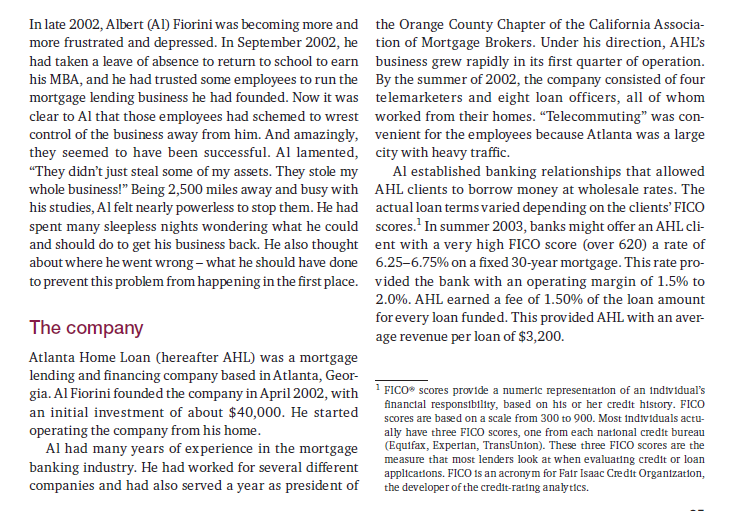
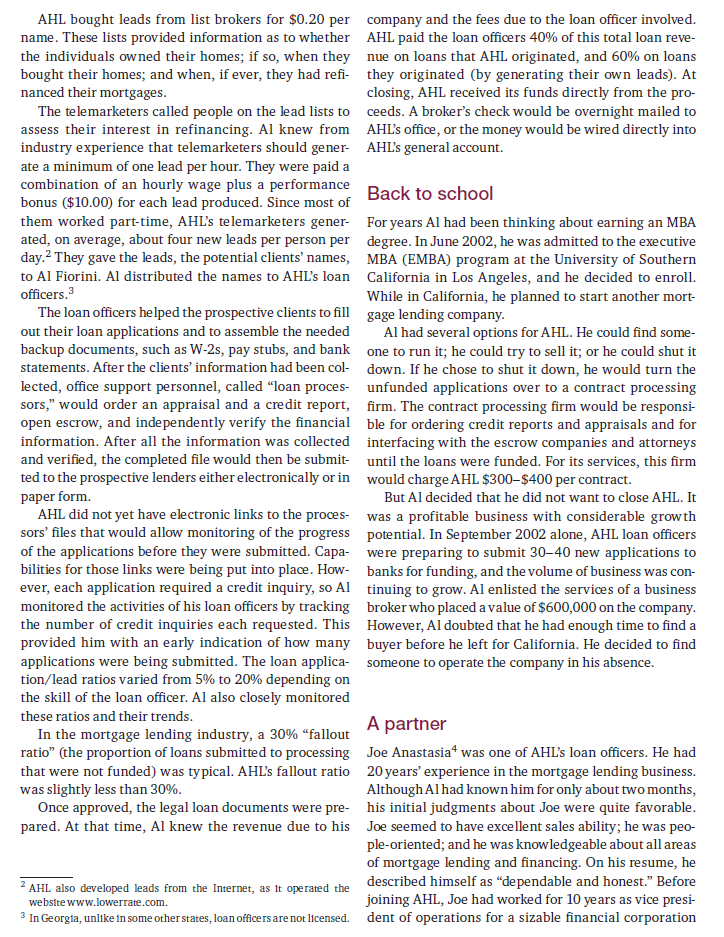
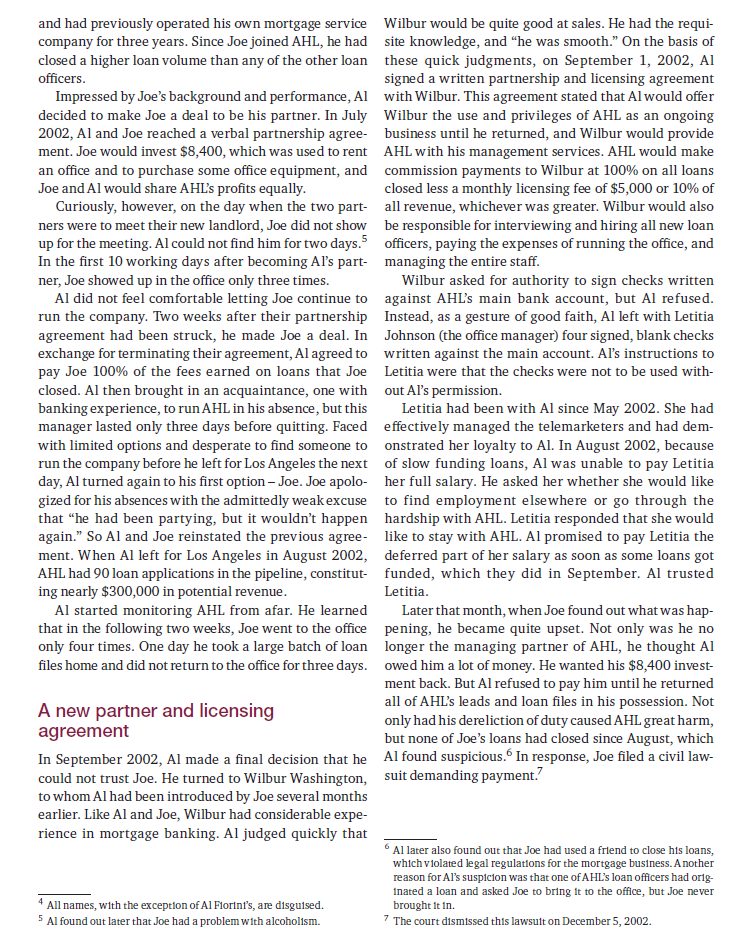
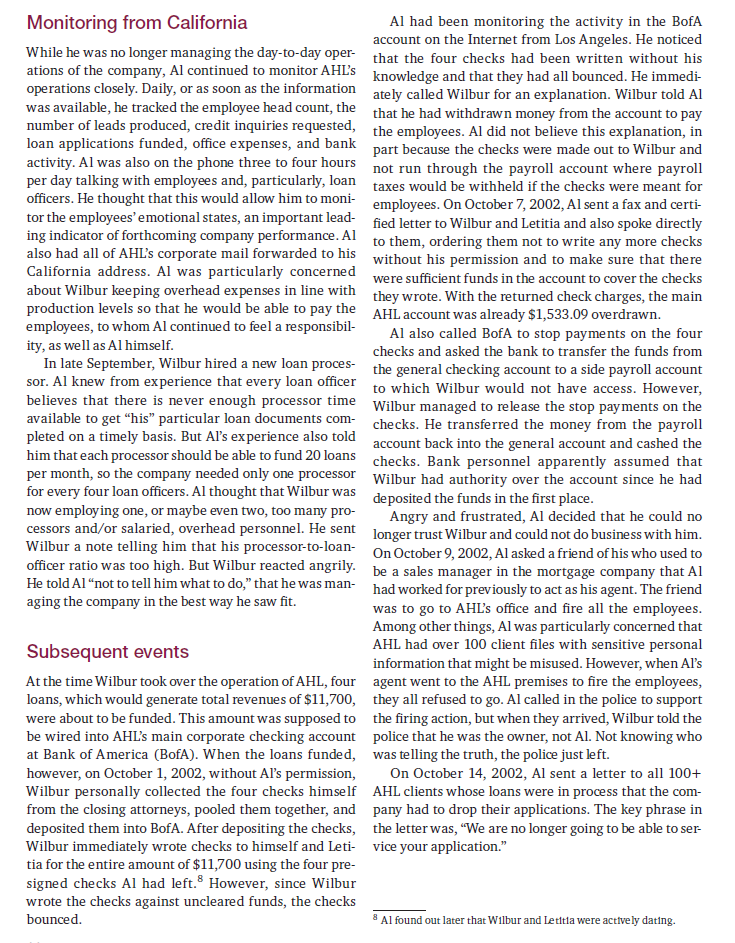
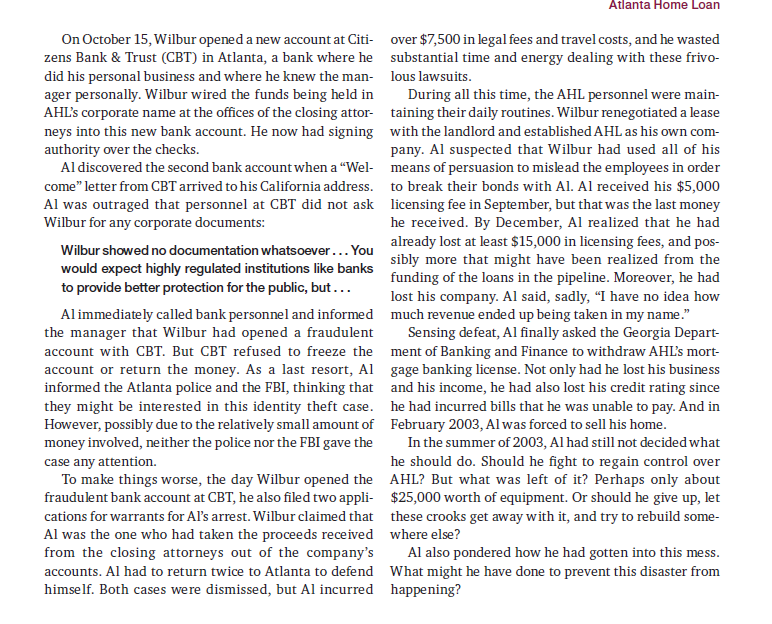
2. Discuss the management accounting and control systems used for Atlanta Home
Loans. As part of your answer to this question:
Describe the various management accounting controls used both before and
after Al Fiorini went back to university to complete his MBA. Make sure that
you classify the management accounting controls using terms provided in
chapters 1, 2 & 3 of the text book i.e. results (specify the type of results),
action (there are many types e.g. pre-action review), personnel/cultural
controls (there are many types e.g. selection and placement) and
rewards/incentives used (what are the rewards? How are they linked to actions
or results?).
The subject of this question is Management Accounting.
In late 2002, Albert (AI) Fiorini was becoming more and the Orange County Chapter of the California Associa- more frustrated and depressed. In September 2002, he tion of Mortgage Brokers. Under his direction, AHL's had taken a leave of absence to return to school to earn business grew rapidly in its first quarter of operation. nis MBA, and he had trusted some employees to run the By the summer of 2002, the company consisted of four mortgage lending business he had founded. Now it was telemarketers and eight loan officers, all of whom clear to Al that those employees had schemed to wrest worked from their homes. "Telecommuting" was con- control of the business away from him. And amazingly, venient for the employees because Atlanta was a large they seemed to have been successful. Al lamented, city with heavy traffic. "They didn't just steal some of my assets. They stole my Al established banking relationships that allowed whole business!" Being 2,500 miles away and busy with AHL clients to borrow money at wholesale rates. The his studies, Al felt nearly powerless to stop them. He had actual loan terms varied depending on the clients' FICO spent many sleepless nights wondering what he could scores. In summer 2003, banks might offer an AHL cli- and should do to get his business back. He also thoughtent with a very high FICO score (over 620) a rate of about where he went wrong-what he should have done 6.25-6.75% on a fixed 30-year mortgage. This rate pro- to prevent this problem from happening in the first place. vided the bank with an operating margin of 1.5% to 2.0%. AHL earned a fee of 1.50% of the loan amount for every loan funded. This provided AHL with an aver- The company age revenue per loan of $3,200. Atlanta Home Loan (hereafter AHL) was a mortgage lending and financing company based in Atlanta, Geor- gia. Al Fiorini founded the company in April 2002, with FICO scores provide a numeric representation of an individual's financial responsibility, based on his or her credit history. FICO an initial investment of about $40,000. He started scores are based on a scale from 300 to 900. Most individuals actu- operating the company from his home. ally have three FICO scores, one from each national credit bureau Al had many years of experience in the mortgage (Equifax, Experian, TransUnion). These three FICO scores are the measure that most lenders look at when evaluating credit or loan banking industry. He had worked for several different applications. FICO is an acronym for Fair Isaac Credit Organization, companies and had also served a year as president of the developer of the credit rating analytics. AHL bought leads from list brokers for $0.20 per company and the fees due to the loan officer involved. name. These lists provided information as to whether AHL paid the loan officers 40% of this total loan reve- the individuals owned their homes; if so, when they nue on loans that AHL originated, and 60% on loans bought their homes; and when, if ever, they had refi- they originated (by generating their own leads). At nanced their mortgages. closing, AHL received its funds directly from the pro- The telemarketers called people on the lead lists to ceeds. A broker's check would be overnight mailed to assess their interest in refinancing. Al knew from AHL's office, or the money would be wired directly into industry experience that telemarketers should gener- AHL's general account. ate a minimum of one lead per hour. They were paid a combination of an hourly wage plus a performance Back to school bonus ($10.00) for each lead produced. Since most of them worked part-time, AHL's telemarketers gener- For years Al had been thinking about earning an MBA ated, on average, about four new leads per person per degree. In June 2002, he was admitted to the executive day. They gave the leads, the potential clients' names, MBA (EMBA) program at the University of Southern to Al Fiorini. Al distributed the names to AHL's loan California in Los Angeles, and he decided to enroll. officers. While in California, he planned to start another mort- The loan officers helped the prospective clients to fill gage lending company. out their loan applications and to assemble the needed Al had several options for AHL. He could find some- backup documents, such as W-2s, pay stubs, and bank one to run it; he could try to sell it, or he could shut it statements. After the clients' information had been col- down. If he chose to shut it down, he would turn the lected, office support personnel, called "loan proces- unfunded applications over to a contract processing sors," would order an appraisal and a credit report, firm. The contract processing firm would be responsi- open escrow, and independently verify the financial ble for ordering credit reports and appraisals and for information. After all the information was collected interfacing with the escrow companies and attorneys and verified, the completed file would then be submit until the loans were funded. For its services, this firm ted to the prospective lenders either electronically or in would charge AHL $300-$400 per contract. paper form. But Al decided that he did not want to close AHL. It AHL did not yet have electronic links to the proces- was a profitable business with considerable growth sors' files that would allow monitoring of the progress potential. In September 2002 alone, AHL loan officers of the applications before they were submitted. Capa- were preparing to submit 30-40 new applications to bilities for those links were being put into place. How- banks for funding, and the volume of business was con- ever, each application required a credit inquiry, so Altinuing to grow. Al enlisted the services of a business monitored the activities of his loan officers by tracking broker who placed a value of $600,000 on the company. the number of credit inquiries each requested. This However, Al doubted that he had enough time to find a provided him with an early indication of how many buyer before he left for California. He decided to find applications were being submitted. The loan applica- someone to operate the company in his absence. tion/lead ratios varied from 5% to 20% depending on the skill of the loan officer. Al also closely monitored these ratios and their trends. A partner In the mortgage lending industry, a 30% "fallout ratio" (the proportion of loans submitted to processing Joe Anastasiawas one of AHL's loan officers. He had that were not funded) was typical. AHL's fallout ratio 20 years' experience in the mortgage lending business. was slightly less than 30%. Although Al had known him for only about two months, Once approved, the legal loan documents were pre- his initial judgments about Joe were quite favorable. pared. At that time, Al knew the revenue due to his Joe seemed to have excellent sales ability; he was peo- ple-oriented, and he was knowledgeable about all areas of mortgage lending and financing. On his resume, he described himself as "dependable and honest." Before 2 AHL also developed leads from the Internet, as it operated the website www.lowerrate.com. joining AHL, Joe had worked for 10 years as vice presi- 3 In Georgia, unlike in some other states, loan officers are not licensed. dent of operations for a sizable financial corporation and had previously operated his own mortgage service Wilbur would be quite good at sales. He had the requi- company for three years. Since Joe joined AHL, he had site knowledge, and "he was smooth." On the basis of closed a higher loan volume than any of the other loan these quick judgments, on September 1, 2002, Al officers. signed a written partnership and licensing agreement Impressed by Joe's background and performance, Al with Wilbur. This agreement stated that Alwould offer decided to make Joe a deal to be his partner. In July Wilbur the use and privileges of AHL as an ongoing 2002, Al and Joe reached a verbal partnership agree- business until he returned, and Wilbur would provide ment. Joe would invest $8,400, which was used to rent AHL with his management services. AHL would make an office and to purchase some office equipment, and commission payments to Wilbur at 100% on all loans Joe and Al would share AHL's profits equally. closed less a monthly licensing fee of $5,000 or 10% of Curiously, however, on the day when the two part- all revenue, whichever was greater. Wilbur would also ners were to meet their new landlord, Joe did not show be responsible for interviewing and hiring all new loan up for the meeting. Al could not find him for two days. officers, paying the expenses of running the office, and In the first 10 working days after becoming Al's part- managing the entire staff. ner, Joe showed up in the office only three times. Wilbur asked for authority to sign checks written Al did not feel comfortable letting Joe continue to against AHL's main bank account, but Al refused. run the company. Two weeks after their partnership Instead, as a gesture of good faith, Al left with Letitia agreement had been struck, he made Joe a deal. In Johnson (the office manager) four signed, blank checks exchange for terminating their agreement, Al agreed to written against the main account. Al's instructions to pay Joe 100% of the fees earned on loans that Joe Letitia were that the checks were not to be used with- closed. Al then brought in an acquaintance, one with out Al's permission. banking experience, to run AHL in his absence, but this Letitia had been with Al since May 2002. She had manager lasted only three days before quitting. Faced effectively managed the telemarketers and had dem- with limited options and desperate to find someone to onstrated her loyalty to Al. In August 2002, because the company before he left for Los Angeles the next of slow funding loans, Al was unable to pay Letitia day, Al turned again to his first option - Joe. Joe apolo- her full salary. He asked her whether she would like gized for his absences with the admittedly weak excuse to find employment elsewhere or go through the that "he had been partying, but it wouldn't happen hardship with AHL. Letitia responded that she would again." So Al and Joe reinstated the previous agree- like to stay with AHL. Al promised to pay Letitia the ment. When Al left for Los Angeles in August 2002, deferred part of her salary as soon as some loans got AHL had 90 loan applications in the pipeline, constitut- funded, which they did in September. Al trusted ing nearly $300,000 in potential revenue. Letitia. Al started monitoring AHL from afar. He learned Later that month, when Joe found out what was hap- that in the following two weeks, Joe went to the office pening, he became quite upset. Not only was he no only four times. One day he took a large batch of loan longer the managing partner of AHL, he thought Al files home and did not return to the office for three days. owed him a lot of money. He wanted his $8,400 invest- ment back. But Al refused to pay him until he returned all of AHL's leads and loan files in his possession. Not A new partner and licensing only had his dereliction of duty caused AHL great harm, agreement but none of Joe's loans had closed since August, which In September 2002, Al made a final decision that he Al found suspicious. In response, Joe filed a civil law- could not trust Joe. He turned to Wilbur Washington, suit demanding payment. to whom Al had been introduced by Joe several months earlier. Like Al and Joe, Wilbur had considerable expe- rience in mortgage banking. Al judged quickly that Al later also found out that Joe had used a friend to close his loans, which violated legal regulations for the mortgage business. Another reason for Al's suspicion was that one of AHL's loan officers had orig- inated a loan and asked Joe to bring it to the office, but Joe never 4 All names, with the exception of Al Florint's, are disguised. brought it in. 5 Al found out later that Joe had a problem with alcoholism. 7 The court dismissed this lawsuit on December 5, 2002. Monitoring from California Al had been monitoring the activity in the BofA account on the Internet from Los Angeles. He noticed While he was no longer managing the day-to-day oper- that the four checks had been written without his ations of the company, Al continued to monitor AHL's knowledge and that they had all bounced. He immedi- operations closely. Daily, or as soon as the information ately called Wilbur for an explanation. Wilbur told Al was available, he tracked the employee head count, the that he had withdrawn money from the account to pay number of leads produced, credit inquiries requested, the employees. Al did not believe this explanation, in loan applications funded, office expenses, and bank part because the checks were made out to Wilbur and activity. Al was also on the phone three to four hours not run through the payroll account where payroll per day talking with employees and, particularly, loan taxes would be withheld if the checks were meant for officers. He thought that this would allow him to moni- employees. On October 7, 2002, Al sent a fax and certi- tor the employees' emotional states, an important lead- fied letter to Wilbur and Letitia and also spoke directly ing indicator of forthcoming company performance. Al to them, ordering them not to write any more checks also had all of AHL's corporate mail forwarded to his without his permission and to make sure that there California address. Al was particularly concerned were sufficient funds in the account to cover the checks about Wilbur keeping overhead expenses in line with they wrote. With the returned check charges, the main production levels so that he would be able to pay the AHL account was already $1,533.09 overdrawn. employees, to whom Al continued to feel a responsibil- Al also called BofA to stop payments on the four ity, as well as Al himself. checks and asked the bank to transfer the funds from In late September, Wilbur hired a new loan proces- the general checking account to a side payroll account sor. Al knew from experience that every loan officer to which Wilbur would not have access. However, believes that there is never enough processor time Wilbur managed to release the stop payments on the available to get "his" particular loan documents com- checks. He transferred the money from the payroll pleted on a timely basis. But Al's experience also told account back into the general account and cashed the him that each processor should be able to fund 20 loans checks. Bank personnel apparently assumed that per month, so the company needed only one processor Wilbur had authority over the account since he had for every four loan officers. Al thought that Wilbur was deposited the funds in the first place. now employing one, or maybe even two, too many pro- Angry and frustrated, Al decided that he could no cessors and/or salaried, overhead personnel. He sent longer trust Wilbur and could not do business with him. Wilbur a note telling him that his processor-to-loan- On October 9, 2002, Al asked a friend of his who used to officer ratio was too high. But Wilbur reacted angrily. be a sales manager in the mortgage company that Al He told Al "not to tell him what to do," that he was man- had worked for previously to act as his agent. The friend aging the company in the best way he saw fit. was to go to AHL's office and fire all the employees. Among other things, Al was particularly concerned that Subsequent events AHL had over 100 client files with sensitive personal information that might be misused. However, when Al's At the time Wilbur took over the operation of AHL, four agent went to the AHL premises to fire the employees, loans, which would generate total revenues of $11,700, they all refused to go. Al called in the police to support were about to be funded. This amount was supposed to the firing action, but when they arrived, Wilbur told the be wired into AHL's main corporate checking account police that he was the owner, not Al. Not knowing who at Bank of America (BofA). When the loans funded, was telling the truth, the police just left. however, on October 1, 2002, without Al's permission, On October 14, 2002, Al sent a letter to all 100+ Wilbur personally collected the four checks himself AHL clients whose loans were in process that the com- from the closing attorneys, pooled them together, and pany had to drop their applications. The key phrase in deposited them into BofA. After depositing the checks, the letter was, We are no longer going to be able to ser- Wilbur immediately wrote checks to himself and Leti- vice your application." tia for the entire amount of $11,700 using the four pre- signed checks Al had left. However, since Wilbur wrote the checks against uncleared funds, the checks bounced. Al found out later that Wilbur and Letitia were actively dating Atlanta Home Loan On October 15, Wilbur opened a new account at Citi- over $7,500 in legal fees and travel costs, and he wasted zens Bank & Trust (CBT) in Atlanta, a bank where he substantial time and energy dealing with these frivo- did his personal business and where he knew the man- lous lawsuits. ager personally. Wilbur wired the funds being held in During all this time, the AHL personnel were main- AHL's corporate name at the offices of the closing attor- taining their daily routines. Wilbur renegotiated a lease neys into this new bank account. He now had signing with the landlord and established AHL as his own com- authority over the checks. pany. Al suspected that Wilbur had used all of his Al discovered the second bank account when a "Wel- means of persuasion to mislead the employees in order come" letter from CBT arrived to his California address. to break their bonds with Al. Al received his $5,000 Al was outraged that personnel at CBT did not ask licensing fee in September, but that was the last money Wilbur for any corporate documents: he received. By December, Al realized that he had already lost at least $15,000 in licensing fees, and pos- Wilbur showed no documentation whatsoever... You sibly more that might have been realized from the would expect highly regulated institutions like banks funding of the loans in the pipeline. Moreover, he had to provide better protection for the public, but ... lost his company. Al said, sadly, "I have no idea how Alimmediately called bank personnel and informed much revenue ended up being taken in my name." the manager that Wilbur had opened a fraudulent Sensing defeat, Al finally asked the Georgia Depart- account with CBT. But CBT refused to freeze the ment of Banking and Finance to withdraw AHL's mort- account or return the money. As a last resort, Al gage banking license. Not only had he lost his business informed the Atlanta police and the FBI, thinking that and his income, he had also lost his credit rating since they might be interested in this identity theft case. he had incurred bills that he was unable to pay. And in However, possibly due to the relatively small amount of February 2003, Al was forced to sell his home. money involved, neither the police nor the FBI gave the In the summer of 2003, Al had still not decided what case any attention. he should do. Should he fight to regain control over To make things worse, the day Wilbur opened the AHL? But what was left of it? Perhaps only about fraudulent bank account at CBT, he also filed two appli- $25,000 worth of equipment. Or should he give up, let cations for warrants for Al's arrest. Wilbur claimed that these crooks get away with it, and try to rebuild some- Al was the one who had taken the proceeds received where else? from the closing attorneys out of the company's Al also pondered how he had gotten into this mess. accounts. Al had to return twice to Atlanta to defend What might he have done to prevent this disaster from himself. Both cases were dismissed, but Al incurred happeningStep by Step Solution
There are 3 Steps involved in it
Step: 1

Get Instant Access to Expert-Tailored Solutions
See step-by-step solutions with expert insights and AI powered tools for academic success
Step: 2

Step: 3

Ace Your Homework with AI
Get the answers you need in no time with our AI-driven, step-by-step assistance
Get Started


